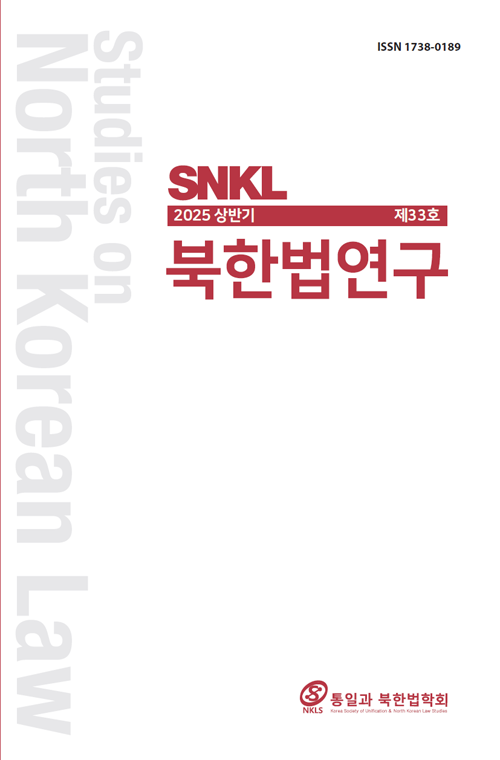평화통일기반조성을 위한 국내법제 정비방향: 가칭 “평화통일기반조성법” 제정의 관점에서
Directions for Reforming Domestic Legislation to Establish a Foundation for Peaceful Unification: From the Perspective of Enacting the Tentative “Act on the Establishment of a Foundation for Peaceful Unification”
- 0

본 논문은 정치적 상황에 따라 부침이 심했던 남북관계를 안정적이고 일관성 있게관리하고 평화통일에 대한 국내적 기반을 조성하기 위한 방안으로 (가칭)“평화통일기반조성법”제정의 당위성과 주요내용을 제시한 것이다. 주지하는 바와 같이 우리 헌법 제4조는 “평화적 통일정책을 수립하고 추진”하도록명령하고 있음에도 불구하고 이에 대한 체계적인 입법은 아직도 부재한 상황이다. 특히, 2018년 이후 남북관계의 발전과 대립이 극단적으로 발생하면서 국내에서 통일에 대한 여론은 분열되고 세대간, 계층간의 갈등은 더욱 깊어졌다. 국제 안보정세는 미국, 중국, 러시아가 주요 사안에 깊이 개입되면서 남북관계 및 통일에 대해서도 영향을미치고 있다. 통일의 당위성은 우리 헌법에서도 찾을 수 있고 헌법이 국민의 의사를 반영한다는 측면에서 볼 때 통일여론의 분열은 통일정책에 더욱 민감한 영향을 미칠 수 밖에없다. 다양한 인종과 민족이 유입되어가는 대한민국의 현실과 분단의 장기화 역시 통일의 당위성에 대한 그간의 논의에 비추어 볼 때 긍정적인 영향을 미치기 어려워지고 있다. 이러한 현실 속에서 본 논문은 남북 분단과 통일의 헌법적 사명이 갖는 중요성에 입각하여 국내적으로 통일의 기반을 마련하기 위한 방향성을 제시하고자 하였다. 이를 위하여 헌법을 필두로 현재 시행되고 있는 통일관계 국내 법률로 대표적인“남북관계발전법”, “남북교류협력법”,“남북협력기금법”,“통일교육 지원법”,“이산가족법”,“북한이탈주민법”과 “민주평통법”에 나타난 통일기반에 관한 규정을 검토하면서별도의 법률제정이 필요함을 제기하였다.
This paper presents the justification and main contents of enacting the tentative “Act on the Establishment of a Foundation for Peaceful Unification” as a means to lay the domestic groundwork for unification by promoting inter-Korean relations in a stable and consistent manner, despite the political fluctuations that have historically characterized them. As is well known, Article 4 of the Constitution of the Republic of Korea mandates the government to “formulate and implement a policy of peaceful unification.” However, systematic legislation to support this constitutional mandate is still lacking. In particular, since 2018, the extreme swings between progress and conflict in inter-Korean relations have led to a fragmentation of public opinion on unification and deepened conflicts across generations and social classes. International security dynamics, with the United States, China, and Russia deeply involved in key issues, are also influencing inter-Korean relations and unification prospects. While the legitimacy of unification can be found in the Constitution, the division of public opinion — a reflection of the democratic will of the people — makes unification policy increasingly sensitive. Moreover, Korea’s growing diversity of races and ethnicities and the prolonged division of the Korean Peninsula make it increasingly difficult to foster positive sentiment toward unification. In light of these realities, this paper aims to propose a direction for establishing a domestic foundation for unification based on the constitutional mission related to division and reunification. To this end, the paper reviews existing domestic laws related to unification, such as the “Development of Inter-Korean Relations Act,” the “Inter-Korean Exchange and Cooperation Act,” the “Inter-Korean Cooperation Fund Act,” the “Unification Education Support Act,” the “Act on Support for Separated Families,” the “Act on the Protection and Settlement Support of North Korean Defectors,” and the “National Unification Advisory Council Act,” in order to highlight the need for a separate piece of legislation. Furthermore, this paper suggests that the tentative “Act on the Establishment of a Foundation for Peaceful Unification” should be based on the principle of constitutional pacifism. It proposes including provisions on the law’s purpose and legal status, the responsibilities of the state and local governments, the formulation of a master plan, the training of professionals, international exchange and cooperation, citizen participation and support for nonprofit organizations, humanitarian cooperation with North Korea, the formation of public opinion and national consensus on unification, and the institutionalization of the public's right to know about North Korea. In conclusion, the proposed legislation should institutionalize the necessary human and material foundations for unification within the country, based on the constitutional spirit of peace and the legitimacy of unification. It should also provide a democratic pathway for citizen participation, thereby securing democratic legitimacy. Moreover, given that peace and stability on the Korean Peninsula can significantly contribute to peace and stability in the international community, the enactment of this law would hold even greater significance.
Ⅰ. 들어가며
Ⅱ. 헌법적 근거
Ⅲ. 통일기반조성에 관한 국내법률의 평가
Ⅳ. 가칭 “평화통일기반조성법”의 제안
Ⅴ. 결론
참고문헌
(0)
(0)